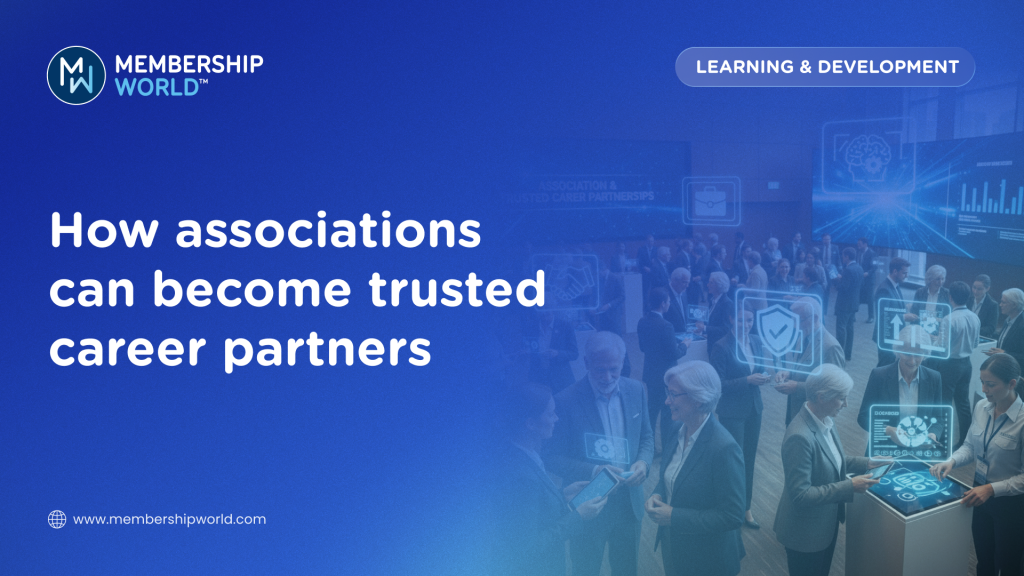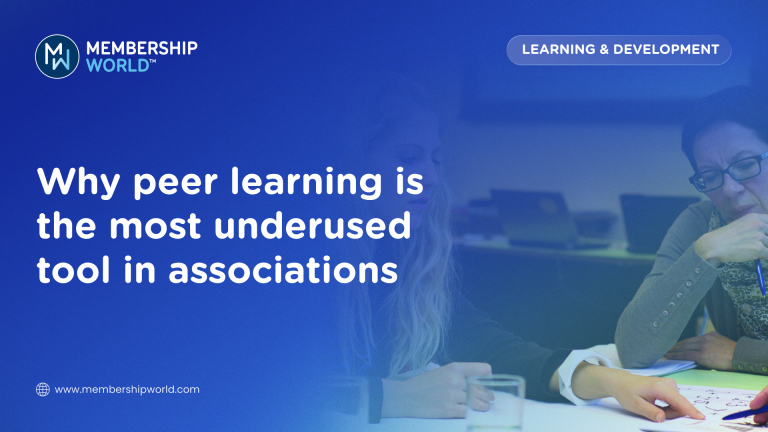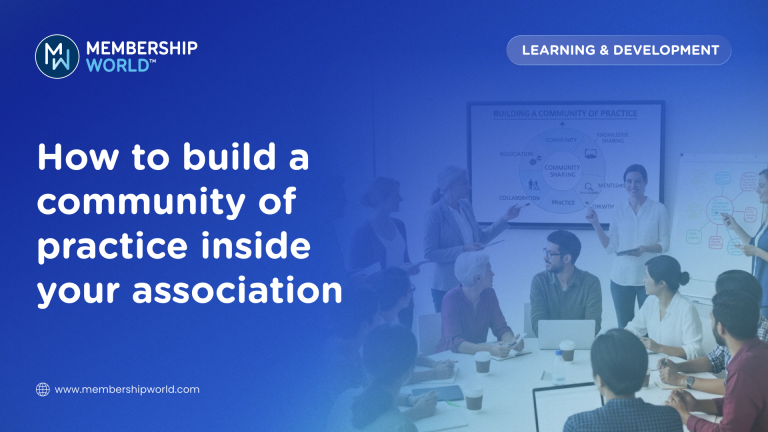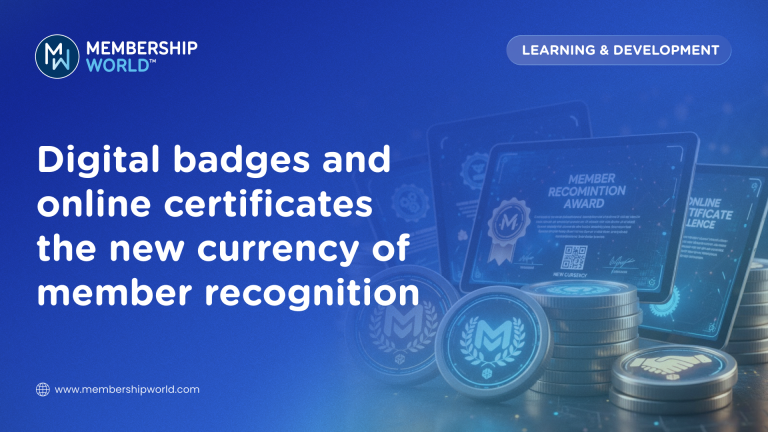
For generations, associations have been the gathering place for professionals who share an identity, an industry, or a cause. Membership has always been about belonging — but in today’s world, members want more than just a community. They want career growth. They want proof that their membership is helping them succeed.
This is why a growing number of associations are rethinking their role: not just as conveners or advocates, but as career partners. In an age where industries are changing faster than ever, associations are uniquely positioned to guide members through uncertainty, upskilling, and long-term career success.
But how does an association actually become a trusted career partner? It requires more than offering webinars or publishing job boards. It means building trust through real value, personalisation, and consistent support that members can’t find anywhere else.
TLDR:
- Members are looking for ongoing career support, not just events or resources
- Associations can deliver this through tailored learning, mentorship, and recognition systems
- Building trust means consistency, relevance, and responsiveness to member needs
- Career partnership strengthens retention and positions associations as essential in a fast-changing world
Why Members Crave Career Partners
The modern workforce looks very different from even a decade ago. Careers are no longer linear, industries are constantly disrupted, and skills have a shorter shelf life than ever before. A recent World Economic Forum report estimated that half of all employees worldwide will need reskilling by 2027.
For individual professionals, this reality creates both anxiety and opportunity. They want to stay competitive, but they don’t know where to start. Many don’t trust employers to fully invest in their development, and universities often can’t keep pace with industry shifts.
This leaves a gap — and associations are perfectly placed to fill it. Associations understand the industry, represent collective expertise, and already have structures in place for professional learning. By positioning themselves as career partners, they can meet one of the most pressing needs of today’s professionals: a trusted ally in career growth.
What Career Partnership Really Means
Becoming a career partner is not just about offering learning products. It’s about an ongoing relationship where members feel:
- Guided — They receive clear signals about what skills matter most.
- Supported — They can access resources, coaching, and communities that accelerate their growth.
- Recognised — Their progress is validated and visible to employers and peers.
- Empowered — They feel ownership of their learning and career trajectory.
Put simply, it’s about moving from membership as access (to events, journals, discounts) to membership as advancement.
Five Ways Associations Can Build Career Partnership
- Curate Clear Career Pathways
Members don’t just want random webinars; they want direction. Associations can provide structured pathways that show exactly which skills or competencies are needed for different career stages.
For example:
- Entry-level: foundational knowledge modules
- Mid-career: leadership, management, or specialised skills
- Senior-level: strategic thinking, mentoring, and advocacy training
These pathways can be visual, interactive, and connected to real job roles in the industry. When members see a clear map of how their association can help them progress, the value of membership becomes concrete.
- Offer Personalised Learning Experiences
Personalisation is no longer optional. With AI and smart data, associations can recommend courses, certifications, or content based on a member’s profile, goals, or past activity.
Instead of sending every member the same newsletter, associations can highlight:
- “Because you attended last year’s leadership summit, here are three resources to deepen your skills.”
- “Members in your role are increasingly learning about data literacy — would you like to start a micro-course?”
This mirrors the kind of tailored experiences members already get from platforms like LinkedIn or Netflix. When associations deliver the same kind of relevance, they stand out as partners who know their members.
- Create Mentorship and Peer-Learning Networks
One of the greatest assets associations have is community. Leveraging that community for structured mentorship and peer learning can be a game-changer.
Mentorship doesn’t need to be formal or long-term. Associations can experiment with:
- Speed mentoring at conferences
- Peer circles for people in similar roles across organisations
- Reverse mentoring where younger professionals teach senior ones about emerging tools and trends
By connecting members with each other, associations become not just a provider of learning but a facilitator of relationships that accelerate careers.
- Recognise and Validate Learning with Micro-Credentials
Members don’t just want to learn — they want proof of what they’ve achieved. This is where micro-credentials, digital badges, and certificates come in.
Associations can issue recognition for:
- Completing courses or pathways
- Demonstrating applied skills in projects or case studies
- Contributing expertise back to the community (e.g., speaking, mentoring, writing)
These recognitions carry weight because they come from a respected industry body. They also help members showcase their progress to employers, making the association part of their professional brand.
- Provide Career Services Beyond Learning
Associations can expand their role by integrating career services directly into membership. This could include:
- Job boards or exclusive listings
- Career coaching or CV reviews
- Salary benchmarking reports
- Networking events with employers
By tying learning opportunities to real career outcomes, associations make themselves indispensable. Members see that their association is not just about education but about tangible career growth.
Building Trust: The Most Critical Factor
None of this works without trust. For an association to truly be seen as a career partner, members must believe that the organisation:
- Understands their needs
- Represents their best interests
- Delivers consistently high-quality experiences
This requires ongoing dialogue. Associations need to listen actively to members through surveys, focus groups, and real-time feedback. They must also be transparent — showing members why certain programs were created, or how industry changes are shaping the offerings.
Trust is built when members feel that their association isn’t just selling courses, but genuinely walking alongside them in their professional journey.
Case in Point: A Membership Advantage
While we won’t name specific associations here, there are powerful examples already happening. Some associations are building dynamic career hubs where members can:
- Take a self-assessment of skills
- Receive a personalised learning plan
- Connect with a mentor in their specialty
- Earn credentials that employers recognise
Others have rebranded their continuing education as career advancement programs, emphasising the link between learning and opportunity. These associations are seeing stronger engagement and retention, because members feel real, measurable value.
The Payoff: Stronger Retention and Industry Impact
When associations position themselves as career partners, the benefits are twofold:
- For Members — They gain confidence, skills, and opportunities. Their membership becomes a career essential rather than a nice-to-have.
- For Associations — They see higher retention, stronger word-of-mouth, and greater relevance in their industry. They become central players in shaping the future workforce.
This is a long-term win. In an era where professional identity and career growth are deeply intertwined, associations that step into this role will thrive. Those that don’t risk being seen as outdated or optional.
Final Thoughts
Associations are at a crossroads. They can remain event organisers and publishers, or they can become something much more powerful: career partners that professionals trust to guide them through change.
The opportunity is clear. By offering pathways, personalisation, mentorship, recognition, and career services, associations can redefine the member relationship. They move from being a place members join to being a partner members rely on.
In doing so, they not only strengthen their own future — they strengthen the future of the entire profession.
💬 Over to you: How does your association currently support members in their careers? What would it take to be seen as their go-to career partner?



